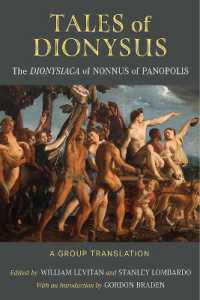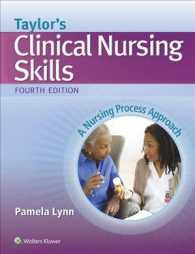Full Description
Over the last forty years, the functionalist approach to linguistic description and explanation has given rise to several major schools of thought that share two crucial assumptions: (i) form is not independent of meaning/function or language use; and (ii) linguistic description and explanation need to take into account the communicative function of language. This volume offers readers interested in functional linguistics a selected sample of studies that jointly prove the efficacy of the analytical tools and procedures broadly accepted within the functionalist tradition in order to investigate language and discourse, with special focus on key pragmatic/discourse notions such as contextualization, grammaticalisation, reference, politeness, (in-)directness, discourse markers, speech acts, subjective evaluation and sentiment analysis in texts, among others. In addition, this volume offers specific corpus-based techniques for the objective contextualisation of linguistic data, which is crucial given the central role allotted to context in both functional linguistics and pragmatics/discourse analysis.
Contents
1. Contributors; 2. Introduction; 3. On the relatedness of functionalism and pragmatics (by Gomez Gonzalez, Maria de los Angeles); 4. I. Methods in the analysis of language and discourse; 5. Developing comprehensive criteria of adequacy: The challenge of hybridity (by Wray, Alison); 6. A method of analysing recontextualisation in the communication of science (by Connolly, John); 7. Contrastive corpus annotation in the CONTRANOT project: Issues and problems (by Lavid, Julia); 8. Form and function in evaluative language: The use of corpora to identify context valence shifters in a linguistically-motivated sentiment analysis system (by Moreno Ortiz, Antonio); 9. Life before Nation: Bibliometrics and L2 vocabulary studies in 1982 (by Meara, Paul); 10. II. Pragmatics and grammar; 11. A lexico-paradigmatic approach to English setting-constructions (by Guerrero Medina, Pilar); 12. How did we think? (by Janssens, Karolien); 13. The adverb truly in Present-Day English (by Simon-Vandenbergen, Anne-Marie); 14. III. Current trends in pragmatics and discourse analysis; 15. Nominal reference and the dynamics of discourse: A cognitive-functional approach (by Davidse, Kristin); 16. 'Pragmatic punting' and prosody: Evidence from corpora (by Romero-Trillo, Jesus); 17. Besides as a connective (by Hannay, Mike); 18. Searle and Sinclair on communicative acts: A sketch of a research problem (by Stubbs, Michael); 19. Strategies of (in)directness in Spanish speakers' production of complaints and disagreements in English and Spanish (by Hidalgo-Downing, Laura); 20. Name index; 21. Term index








